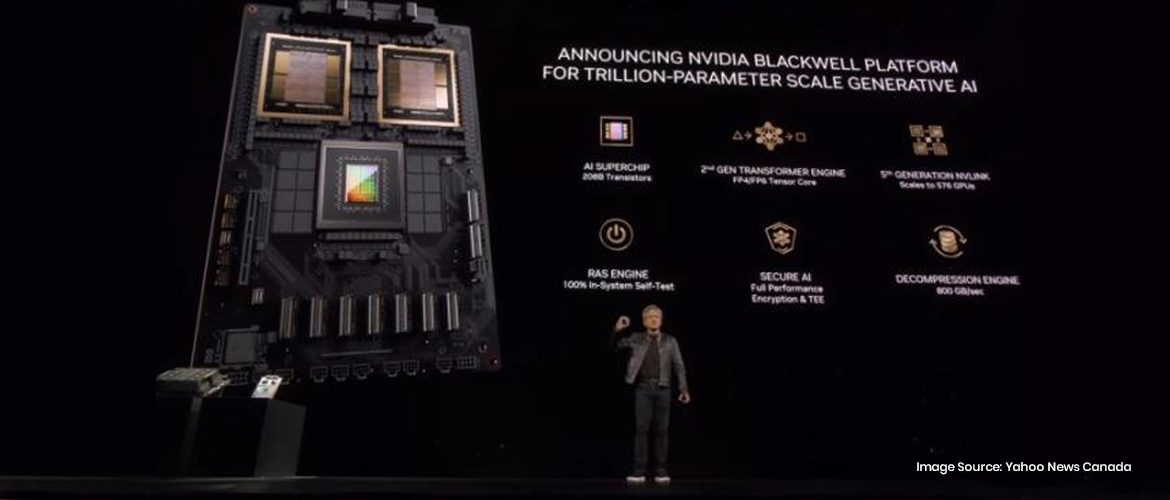Nvidia Unveils Blackwell: The Next Frontier of AI Processing Power

AI & ML
Blackwell: Unveiling the Powerhouse
Nvidia unveiled the Blackwell architecture at its annual GTC (GPU Technology Conference) conference. Here’s a breakdown of what makes this chip so significant:Unmatched Processing Power
Blackwell boasts a mind-boggling number of transistors – a staggering 208 billion. This translates to significantly faster processing speeds compared to previous AI chips, enabling AI models to handle complex tasks with greater efficiency.Custom-Built Manufacturing
Utilizing a cutting-edge 4-nanometer (4NP) TSMC manufacturing process, Blackwell pushes the limits of miniaturization, leading to increased performance and potential for even more powerful chips in the future.Grace CPU Integration
Blackwell integrates the Nvidia Grace CPU with the Nvidia B200 Tensor Core GPUs, creating a unified processing unit. This allows for seamless communication and collaboration between central processing and graphics processing, optimizing performance for AI workloads.High-Speed Networking
Blackwell integrates seamlessly with Nvidia’s Quantum-X800 InfiniBand and Spectrum-X800 Ethernet networking solutions. This ensures efficient data transfer between AI systems, crucial for large-scale AI applications.Revolutionizing AI: Potential Applications
The increased processing power of Blackwell opens doors to a wide range of groundbreaking AI applications in the US:Advanced Robotics
Blackwell can empower robots with faster decision-making capabilities, enabling them to navigate complex environments, perform intricate tasks, and contribute to advancements in automation and industrial applications.Self-Driving Cars
Faster processing of sensor data allows for more accurate real-time decision-making for self-driving vehicles, paving the way for safer and more reliable autonomous transportation.Medical Diagnosis and Treatment
Blackwell can accelerate medical research and development, enabling AI to analyze vast amounts of medical data for faster and more accurate diagnoses, personalized treatment plans, and drug discovery breakthroughs.Natural Language Processing (NLP)
Blackwell can improve the capabilities of chatbots, virtual assistants, and machine translation tools, leading to more natural and human-like interactions with AI systems.Generative AI
The immense processing power of Blackwell can fuel advancements in generative AI, allowing for the creation of more realistic and creative content, such as artwork, music, and even video.The US at the Forefront of AI Innovation
The development of the Blackwell architecture by Nvidia, a US-based company, positions the US at the forefront of AI innovation. This translates to potential benefits across various sectors:Job Creation
The development and deployment of AI technologies will create new job opportunities in research, engineering, software development, and data science.Economic Growth
Advancements in AI have the potential to revolutionize industries, boosting economic growth and competitiveness for US businesses.Scientific Discoveries
Powerful AI tools will accelerate scientific research and development, leading to breakthroughs in various fields.Challenges and Considerations
While the potential of Blackwell is undeniable, there are challenges to address:Cost
Advanced AI chips like Blackwell are often expensive, potentially limiting accessibility for some companies and research institutions.Ethical Considerations
The increasing capabilities of AI raise ethical concerns about potential bias, transparency, and responsible development.Workforce Readiness
As AI automates tasks, ensuring a smooth transition for the workforce and promoting skills development are crucial considerations.The Road Ahead: A Future Powered by AI
The introduction of the Blackwell architecture marks a significant leap forward in AI processing power. With this advancement, the US has the potential to become a global leader in AI research, development, and deployment. However, navigating the ethical considerations and ensuring responsible development are crucial to harnessing the full potential of AI for the benefit of society.You Might Be Interested In:
- Beyond Likes and Followers: Exploring the Evolving Landscape of Social Media
- Is TikTok Facing a US Ban? Decoding the New Law and Its Impact on Millions of Users
- Click, Buy, Pollute? Environmental Impact of Online Shopping and Ways for Sustainable E-commerce
- The High Price of Crypto: Environmental Cost of Mining and Solutions for a Greener Future
Frequently Asked Questions?

01
Cybersecurity
Beyond Likes and Followers: Exploring the Evolving Landscape of Social Media
Apr 28, 2024
01
Tech news
Is TikTok Facing a US Ban? Decoding the New Law and Its Impact on Millions of Users
Apr 27, 2024

01
Tech news
Click, Buy, Pollute? Environmental Impact of Online Shopping and Ways for Sustainable E-commerce
Apr 26, 2024

01
AI & ML
Gemini Evolves: Your AI Assistant on the Go with the New Overlay Feature
Apr 24, 2024
SUSBSCRIBE TO OUR NEWSLETTER
Join our subscribers list to get the latest news and special offers.
Beyond Likes and Followers: Exploring the Evolving Landscape of Social Media
Is TikTok Facing a US Ban? Decoding the New Law and Its Impact on Millions of Users
Click, Buy, Pollute? Environmental Impact of Online Shopping and Ways for Sustainable E-commerce
The High Price of Crypto: Environmental Cost of Mining and Solutions for a Greener Future